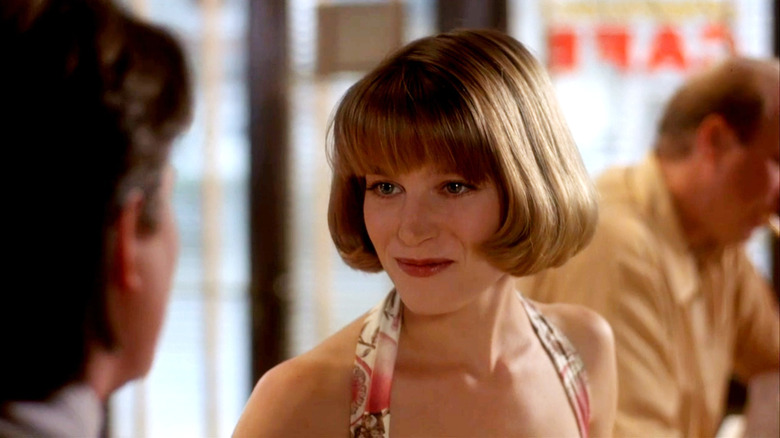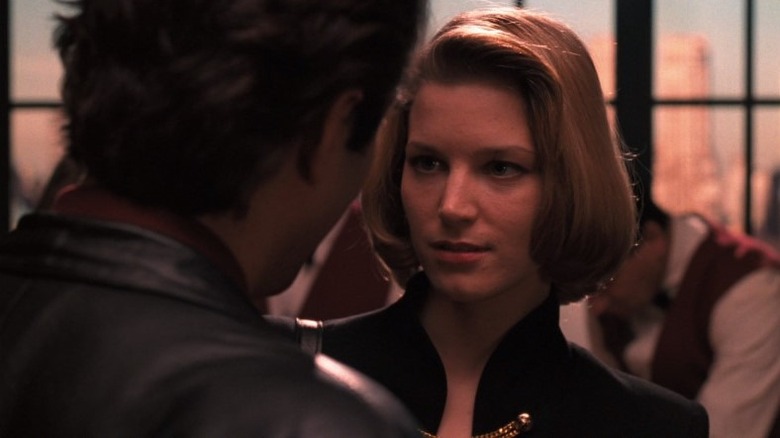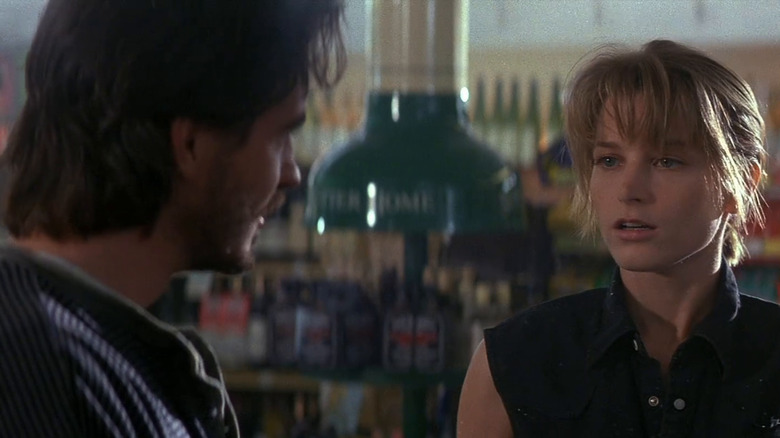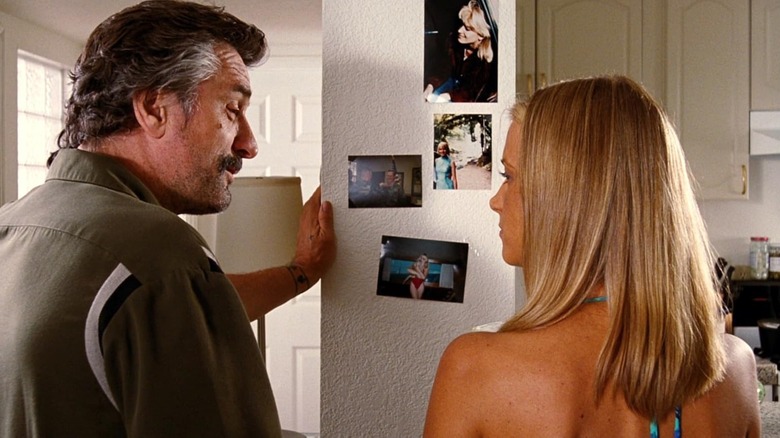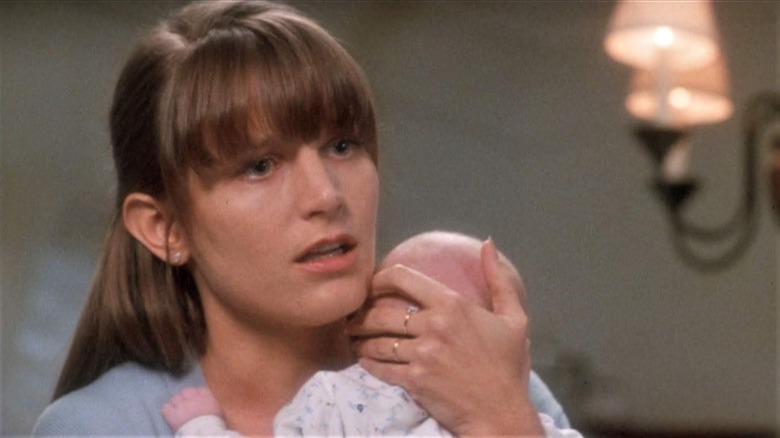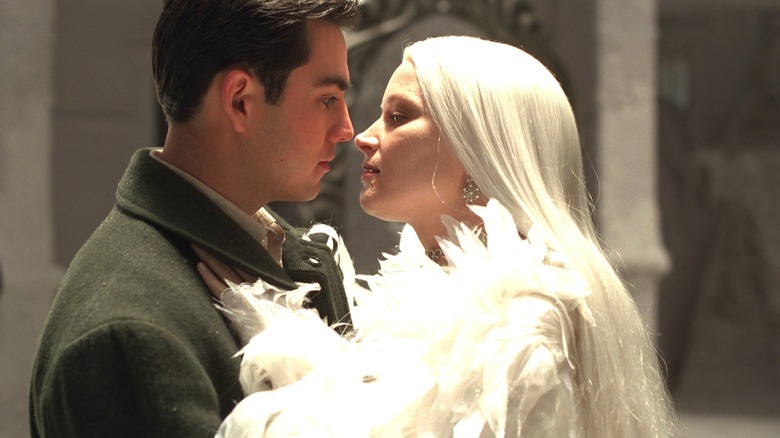Why Bridget Fonda Disappeared From Hollywood
Bridget Fonda is the daughter of Peter Fonda, the granddaughter of Henry Fonda, and the niece of Jane Fonda, so it only seemed natural that she would become an actor. She started appearing on stage as a girl and appeared in "Easy Rider" with her father when she was only five years old.
Fonda would go on to study method acting at the famed Lee Strassberg Theater. She started appearing in films only two years after graduating at NYU. Acting was in her blood and it seemed like she never considered doing anything else. From 1988 to 2002, Fonda appeared in dozens of high-profile Hollywood films, and was nominated for two Golden Globes and an Emmy. She retired unexpectedly in 2002 and hasn't been seen on screen since. Throughout the 1990s, however, Fonda was something of a cinematic "It" girl, appearing in raucous comedies, dramatic indies, intense crime films, and a few of Sam Raimi's productions.
Why did she retire? It was largely because she wanted to spend more time with her family and her then new husband, legendary film composer Danny Elfman (whom she married in 2003). That same year, she also suffered a serious spinal injury in a car accident and likely wanted some time to recover. Rather than work her way back into the Hollywood pantheon, Fonda took some time for herself.
Her career in the 1990s, however, is enviable and impressive.
Bridget Fonda's meteoric rise
Fonda's first major role was in the "Trista and Isolde" segment of the 1988 anthology film "Aria," a strange and ambitious opera film featuring shorts from some of the world's biggest directors. Robert Altman directed a segment, as did Jean-Luc Godard, Ken Russell, Derek Jarman, and Nicolas Roeg. Fonda appeared in the short directed by Franc Roddam, the man behind "Quadrophenia." It was an auspicious beginning.
From 1988 to 1991, Fonda appeared in 10 notable, high-profile movies, some of them nominated for Academy Awards. She played a potential love interest for David Liesure in "You Can't Hurry Love," and had a supporting role in the erotic thriller "Scandal." She was also in the lighthearted romantic comedy "Shag: The Movie," where she starred opposite Annabeth Gish, Phoebe Cates, and Page Hannah, as well as the indie comedy "Strapless." She additionally appeared in the final directorial effort of Roger Corman, "Frankenstein Unbound," wherein she played Mary Shelley. Finally, at the end of 1990, she played the role of Grace Hamilton in Francis Ford Coppola's "The Godfather Part III." Fonda, it seems, was a bolt from the blue, suddenly everywhere.
Fonda was likewise a regular in low-budget thrillers such as "Iron Maze" and "Out of the Rain," but would also play a romantic lead in films like "Doc Hollywood" and a romantic rival in "Drop Dead Fred" (also starring Cates). Her constant presence in Hollywood gained her "crush" status among young people of an entire generation. She hadn't yet landed a lead role, though, as her biggest movies were still ahead of her.
Bridget Fonda, lead actor
In 1992, Fonda appeared in her first leading role, starring in Barbet Schroeder's intense sapphic thriller "Single White Female." That film saw Fonda's character accepting a new roommate, played by Jennifer Jason Leigh, who becomes weirdly obsessed with her. Before long, the Leigh character is dressing like Fonda and trying to usurp her life. It was a handy, scary two-hander that made $84 million on a $16 million budget. While not well-reviewed at the time, it was widely seen on cable TV.
Also in 1992, Fonda was a member of the ensemble of Cameron Crowe's "Singles," one of the definitive films of the 1990s. That same year, she has a cameo in Sam Raimi's "Army of Darkness," cementing an element of cult cred. (By coincidence, Elfman composed a march for "Army of Darkness," years before Fonda went on to marry him.) At the time, Fonda was dating actor Eric Stolz. Although the decade was only two years old, Fonda was already emerging as one of the central faces of the era.
Fonda's second leading role was also a major hit. She played an identity-shifting assassin in John Badham's "Point of No Return," a remake of Luc Besson's "La Femme Nikita." Her role was intense and violent, and proved that she had a lot of range as an actor. She allegedly beat out Julia Roberts, Madonna, Demi Moore, Winona Ryder, and Juliette Lewis for the part.
Bridget Fonda was always prolific
Fonda was never one to rest on her laurels, which may be part of the reason why her retirement seemed so sudden. From 1993 through 1998, she appeared in an average of three films a year, all of them either major studio productions or projects helmed by notable directors. She appeared in Bernardo Bertolucci's "Little Buddha" opposite multiple Keanu Reeves segments. She was also in the hot comedy "It Could Happen to You" with Nicolas Cage, in which she played a waitress who was gifted a winning lottery ticket by an itinerant cop. Fonda even appeared as a repressed housewife in Alan Parker's bonkers gross-out biography/comedy "The Road to Wellville" (starring John Cusack, Anthony Hopkins, Matthew Broderick, and many others) and acted for Deepa Mehta in the 1994 comedy "Camilla."
From there, her résumé continued to expand. She reunited with her "Godfather Part III" co-star Al Pacino for "City Hall" in 1996, worked with Paul Schrader in the messiah comedy "Touch," and even played a voice role in the animated dog movie "Balto." Many will no doubt also recall her role as the stoner beach bunny Melanie in Quentin Tarantino's "Jackie Brown."
1998 provided what might've been Fonda's best role at that stage, playing the Lady Macbeth-like Sarah in Sam Raimi's "A Simple Plan." In that film, Sarah's husband (Bill Paxton) finds a suitcase full of money in the woods and Sarah pushes very hard for them to keep it. Her intense greed lead to various schisms between her husband, his family, his friends, and his sense of common decency. Elfman also scored that film. It was around this time that she and Stoltz broke up, and she began dating Elfman instead.
Bridget Fonda's final acting roles
Fonda didn't slow down after that, even as her retirement approached. A year after "A Simple Plan," she starred in the creature comedy "Lake Placid" and Henry Selick's partly-animated supernatural slapstick farce "Monkeybone." She also acted under the direction of Dwight Yoakam in "South of Heaven, West of Hell," and returned to assassin-like action for "Kiss of the Dragon," starring opposite Jet Li. There was nothing she wouldn't say no to, it seemed. Her final theatrical feature came in 2001, when Fonda starred in the low-budget romance "The Whole Shebang."
After that, Fonda moved to TV, appearing in the TV movies "No Ordinary Baby" and as the title character in "Snow Queen," based on the same Hans Christian Andersen fairy tale that inspired "Frozen." And then, all of a sudden, Fonda was gone, out of the public eye.
In 2003, Fonda was involved in a terrible car crash on the Pacific Coast Highway. According to reports at the time, her car was totaled but she seemingly survived with only cuts and bruises. It wasn't revealed until later that she had also suffered a vertebra fracture. The prognosis was never made public, but it appears that her recovery took a long while. The following month, People Magazine announced that Fonda and Elfman were to wed. It was a low-profile announcement and a non-public wedding. Two years later, Fonda and Elfman had a son, Oliver.
Although she has made no official statement, one can assume that Fonda retired to recover from her injury and to spend time with her family.
The torrent of Bridget Fonda retrospectives
In a 2021 article for Closer, Fonda acknowledged her ubiquity throughout the 1990s, musing that she could practically fill her own section at a local video store. She admitted in a roundabout way that she was a little embarrassed by some of her choices, saying that making a movie should be carefully considered, almost like the choice one makes in having a child. She also knew very much that she was a nepo-baby and that her contemporaries had to work harder to make it than she did.
Fonda hasn't given many interviews in recent years, and Elfman rarely talks about his personal life. Fonda, now 60, has been living out of the public eye for the last 20 years. Occasionally, a tabloid will publish a paparazzo-taken photograph, but those articles are violations of her privacy. Page Six did reveal that Fonda and Elfman like to host elaborate themed Christmas parties every year, however, and they sound very fun. Fonda, because of her sudden retirement, has been the subject of many speculative retrospectives — just like this one! — wherein people seek information as to where she might be.
It seems that she is where she wants to be. Fonda was once mobbed by reporters at LAX back in 2009, and they asked her if she had any plans on returning to acting "I don't think so," she answered, "it's too nice being a civilian." The same article in the Independent recounted an incident from 1997 when Fonda was working on "Jackie Brown" and found herself sinking into a deep depression. She called her aunt Jane for some advice, and Jane Fonda told her that life isn't something that happens to you, but something you make.
Bridget Fonda seems to have taken that advice to heart. She's now making her own life.
